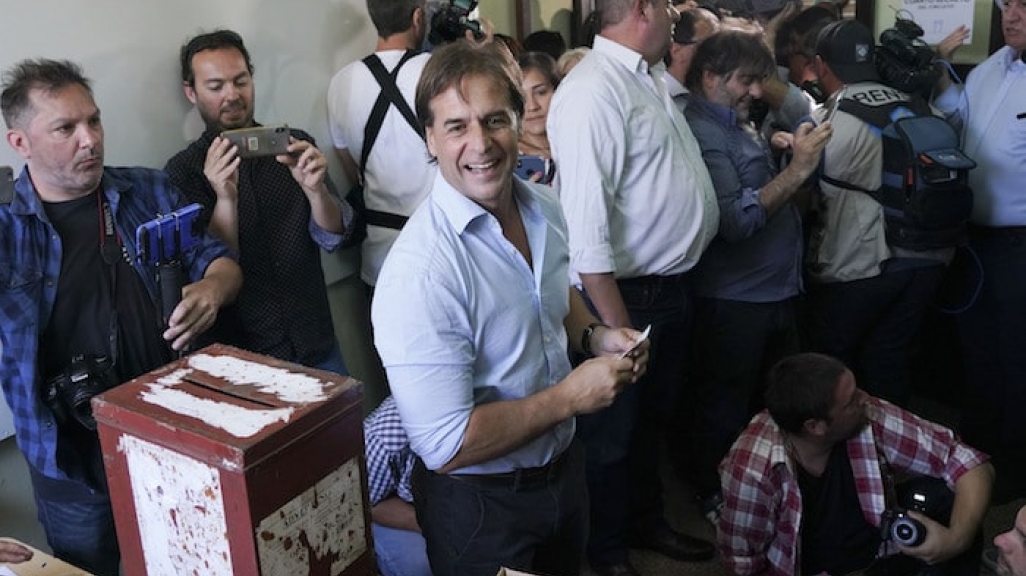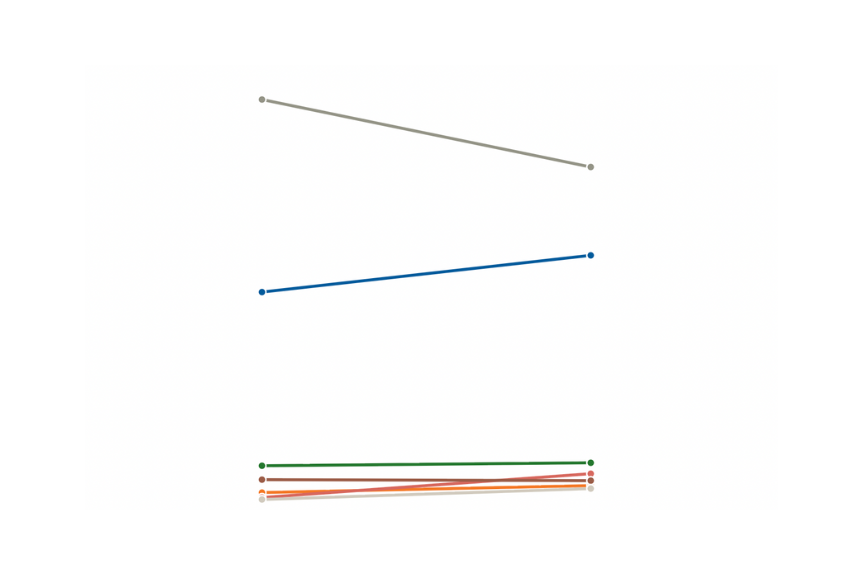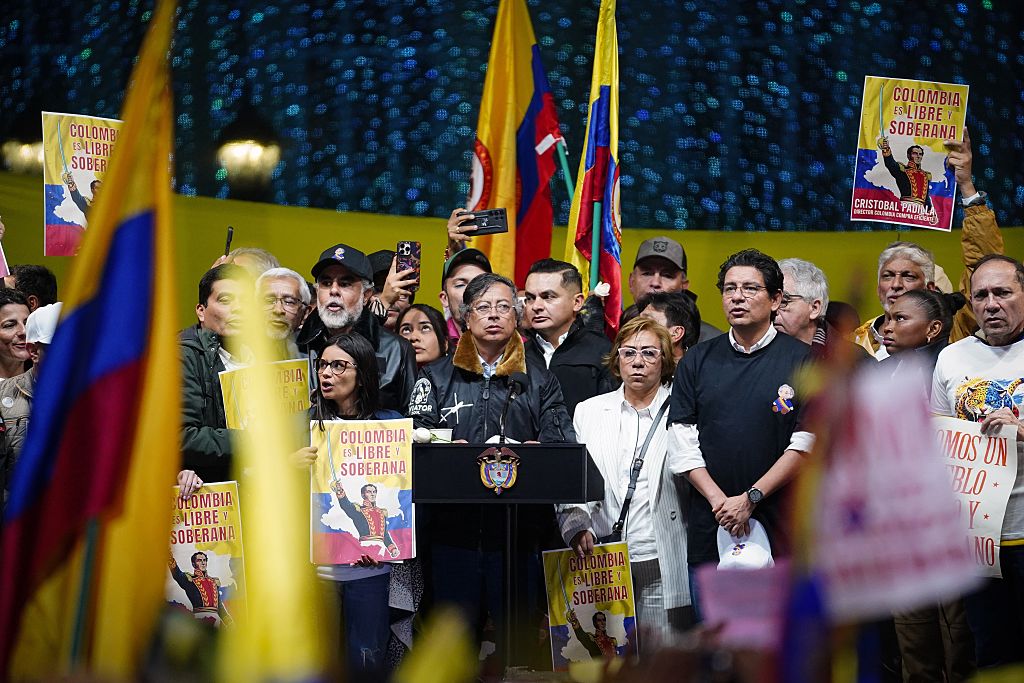AS/COA Insider: Juan Cruz Díaz on What Lacalle Pou's Victory Means for Uruguay
AS/COA Insider: Juan Cruz Díaz on What Lacalle Pou's Victory Means for Uruguay
The special advisor to AS/COA explains why the center-right candidate won the tight runoff and how the outcome affects the region.
It was a photo finish so close—with just 30,000 votes separating the two candidates in preliminary counts—that it took four days to call the election. But on November 28, Luis Lacalle Pou of the center-right Partido Nacional claimed victory in Uruguay’s runoff presidential vote. Daniel Martínez of the Broad Front, the coalition now in power for 15 years, conceded.
Juan Cruz Díaz, managing director of Cefeidas Group and special advisor to AS/COA, explains why the center-right candidate, who takes office March 1, won the tight runoff and what his victory means in a regional context.
- Get more context about the election in our Uruguay Election Guide.
- To speak with an expert on this topic, please contact mediarelations@as-coa.org.
AS/COA Online: After 15 years of the Frente Amplio in power, Luis Lacalle Pou won in the runoff. Why were Uruguayans looking for this change?
Juan Cruz Díaz: I think there are a number of issues that contributed to this electoral outcome.
First of all, there is a sense of fatigue after 15 years of the ruling of the Frente Amplio in Uruguay. In any other country in the world, you get a sense of voter fatigue toward a party that has been running a country for so many years.
Of course, the Frente Amplio did a good job in terms of promoting economic growth and social inclusion, giving a social safety net to more disadvantaged sectors of the population. With certain economic stresses, such as slowing growth and rising unemployment, you get a sense of dissatisfaction from broad sectors of the population, and this was also a factor in terms of economic demands. On top of that, once you get the state to deliver more economic stability to many sectors of the population, there is an ambition for more and demands start to change. For example, there was a sense of rising levels of insecurity, and in some cases the perception of corruption in a country that historically doesn’t have those kinds of demands.
Having said that, the Frente Amplio performed quite impressively. After 15 years, getting the amount of votes they got is not a minor thing. The margin was very thin, and Lacalle Pou did not win more than 50 percent of votes overall, so this creates a situation in which the Frente Amplio is still very strong.
I want to add something else, and that is that one of the things that the Frente Amplio failed to do, in my view, was to create a sense of the younger population taking control of the party. Presidents José Mujica and Tabaré Vázquez represent an older generation with a long history in Uruguay and, while Daniel Martínez is from a younger generation, still the perception of the Front needs some type of renewal. That in a way is connected to the fatigue that society felt with the Frente Amplio.
AS/COA Online: What were the issues that dominated this election?
Díaz: I think the economy was a big part of the election, and that society started to have more demands in a regional and global context that is quite challenging. Uruguay is vulnerable to what happens in Brazil and Argentina, and both countries have been through many complicated times in the past few years, so that also affects Uruguay’s economy.
One other issue that got a lot of attention during the campaign was insecurity. Again, that is something that in Uruguay historically has not been at the top of the agenda, and we saw rising levels of insecurity. I think that Lacalle Pou tried to address this issue, and even Martínez talked about this issue in the campaign, and of course, the Cabildo Abierto candidate of the far right was talking about security.
International affairs also became an issue. The stance toward Venezuela that the Frente Amplio had in the last few years was one, and Lacalle Pou is expected to have a different approach to that as well. Of course, Lacalle Pou represents a party that would like to have a less interventionist role of the state in economic affairs than did the Frente Amplio, and will take a somewhat different approach to improving economic conditions. A large part of his campaign was focused on talking about modernizing the way that the state and government works and promoting a larger role for the private sector in economic affairs.
AS/COA Online: We will also have a new legislature. What will the makeup of the legislature be and will Lacalle Pou be able to work with it?
Díaz: The situation was so balanced in the election, and that is reflected in a way in Congress. Of course, the Frente Amplio is better positioned as they have the most seats. Lacalle Pou is well positioned as well, but the problem for Lacalle Pou is that he ran in the second round with a coalition of different parties and they are not always aligned. None of these parties has quorum in any chamber, so they need to negotiate to push through legislation. He will need to negotiate with the Partido Colorado and, more challengingly, with Cabildo Abierto—this new force on the right whose leader Guido Manini Ríos probably has presidential ambitions for the future, and will push a more far-right agenda.
So while we can anticipate that Lacalle Pou and the Partido Nacional* will have more grounds to negotiate, the word is that Ernesto Talvi, the Partido Colorado candidate, will be the minister of foreign affairs, and we can see that there are several grounds on which they can negotiate a platform together. The votes of Cabildo Abierto will be needed to pass certain important laws, and Cabildo Abierto will be harder to negotiate with in the sense that they will be less moderate. We are seeing these discussions now in the creation of a cabinet, in which we have probably foreign affairs from Partido Colorado, and some social development areas where Partido Colorado could work. Probably the economic policy will be in the hands of Partido Nacional, and maybe the security area will go to Cabildo Abierto, which makes sense.
But the big question for me is how challenging it will it be for Lacalle Pou to keep that coalition together, especially with Cabildo Abierto, and looking towards the next presidential election.
AS/COA Online: You mentioned Ernesto Talvi being the new foreign minister. What does Lacalle Pou’s win mean for foreign relations, particularly neighbors Argentina and Brazil?
Díaz: It certainly comes at a very interesting regional moment, not only in Argentina and Brazil. Looking at what’s happening in Chile, which has been a model for many right-of-center candidates in the region, including what might have been a model for people around Lacalle Pou. And now that model is in crisis. We’re seeing turbulent times in Bolivia, Peru, Ecuador, and Colombia, and Brazil is also going through a particular moment with the presidency of Jair Bolsonaro and the liberation of ex-President Luiz Inácio Lula da Silva.
Argentina now is going through a presidential transition, which is characterized by a shift of parties and ideologies and how to approach policies, foreign affairs, and trade. This is a big question mark because Lacalle Pou will try to make Mercosur more flexible and give Uruguay more options to gain new markets without a corset, and in this sense Bolsonaro might be a sort of ally—but not too much. If it’s true that Brazil really wants to move on and declare the death of Mercosur, that is probably too much for Uruguay.
With Argentina, President-elect Alberto Fernández kept it no secret that he supported Martínez and even went to visit him, so that will put challenges in the bilateral relationship especially because of the economic importance that Argentina has for Uruguay, with migration and historical connections. There is a lot that ties these two countries.
Having said that, they have already had constructive communication, and Uruguay is less polarized than other countries. We have seen in the last few days a rally where President-elect Lacalle Pou was present and a Frente Amplio supporter wished him success . However, he will need to find some type of equilibrium there. If Talvi—a well-respected academic and economist with strong ties to the United States—is the minister of foreign affairs, I’m sure he will try to get a strong relationship with Washington and Brazil, and try to have some equilibrium with Argentina.
I think we’re living very interesting times in the region, and it remains to be seen how all these new presidents play out.
This interview has been edited for clarity and length.
*Editor’s note: An earlier version of this article referred here to the Partido Colorado rather than the Partido Nacional.










